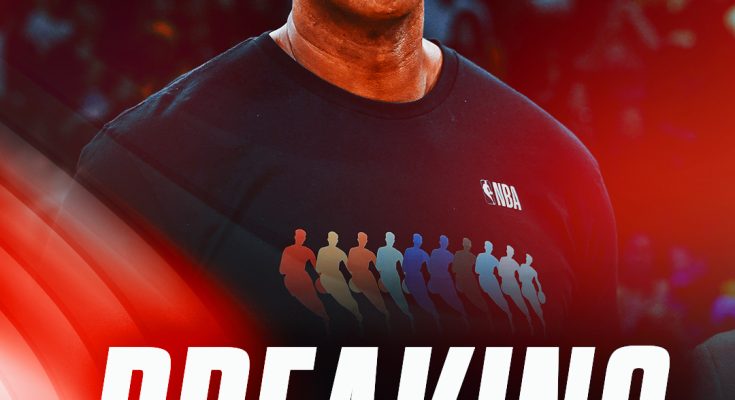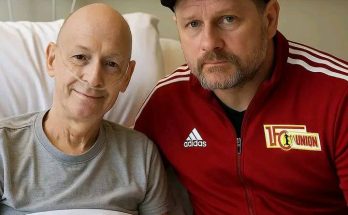Jason Collins, the 13-year NBA veteran and ambassador for the league, has shared deeply personal news that he is currently receiving treatment for a brain tumor. This revelation has sent ripples through the basketball community, highlighting both the human vulnerability of professional athletes and the resilience required to face life-altering health challenges. Collins, who enjoyed a distinguished career spanning more than a decade in the NBA, is recognized not only for his on-court contributions but also for his role as a trailblazer and advocate off the court. His announcement underscores the reality that health challenges can affect anyone, regardless of fame, success, or physical conditioning, and it draws attention to the importance of medical care, emotional support, and public awareness surrounding serious health conditions.
Collins’ NBA career is a testament to perseverance, adaptability, and professionalism. Over 13 seasons, he played for multiple teams, demonstrating consistent performance, leadership, and a capacity to contribute both as a starter and a role player. His presence in the league went beyond statistics; Collins was respected for his basketball IQ, work ethic, and ability to inspire teammates through example. His journey through the NBA included moments of triumph, challenges, and personal growth, culminating in a career that left an indelible mark on the sport. His current health struggle is an extension of the challenges he has faced, though it now occurs away from the spotlight of the hardwood.
The diagnosis and treatment of a brain tumor is a significant event in anyone’s life, and for Collins, it represents a period of medical complexity and emotional weight. Brain tumors, depending on their type, location, and severity, can present a range of symptoms and require multifaceted treatment approaches. Collins’ decision to share this news publicly reflects both courage and a desire to raise awareness about serious health conditions. By doing so, he provides a human connection to the medical realities many people face, showing that even those who appear strong, resilient, and physically elite are not immune to life-altering health events.
Throughout his career and post-retirement, Collins has been an advocate for inclusion, representation, and the positive impact of sports on society. His openness about personal struggles, including mental health and identity, has made him a figure of inspiration for many beyond basketball. The announcement of his treatment for a brain tumor adds a new dimension to this narrative, illustrating the intersection of health, personal resilience, and public influence. Collins’ approach to sharing his journey is likely to offer comfort and encouragement to those facing similar medical challenges, while also fostering a broader conversation about healthcare, early detection, and the emotional support needed for patients and families navigating serious illnesses.
The support of Collins’ family and loved ones is an essential component of his treatment and recovery process. Facing a brain tumor involves not only medical interventions but also emotional, psychological, and logistical challenges. Family members often serve as advocates, caregivers, and sources of motivation, providing stability and encouragement during what can be an overwhelming experience. Collins’ acknowledgment of his family’s role in his journey highlights the importance of community and the human connections that sustain individuals through difficult health battles. Their involvement ensures that he receives comprehensive care, emotional support, and practical assistance throughout the treatment process.
From a medical perspective, the treatment of brain tumors is complex and highly individualized. Depending on the tumor’s characteristics, interventions may include surgery, radiation therapy, chemotherapy, targeted therapies, or a combination of approaches. Each patient’s situation is unique, and the success of treatment depends on multiple factors, including early detection, the expertise of medical teams, and the patient’s overall health. Collins’ treatment likely involves careful coordination among specialists, ongoing monitoring, and adjustments to ensure the best possible outcomes. Sharing his experience publicly can help demystify the process for others, providing insight into the challenges and considerations associated with serious medical conditions.
Collins’ announcement also underscores the emotional toll associated with such a diagnosis. Beyond the physical impact, a brain tumor can introduce uncertainty, stress, and anxiety, not only for the individual but also for family, friends, and close supporters. Emotional resilience becomes a critical aspect of coping, requiring strength, focus, and the support of mental health professionals, loved ones, and community networks. Collins’ decision to share his journey openly reflects a willingness to confront these emotional realities and a desire to inspire others to face adversity with courage and determination.
The basketball community has historically rallied around figures facing health challenges, offering support, resources, and solidarity. Collins’ announcement is likely to elicit an outpouring of encouragement from former teammates, coaches, league officials, and fans. These gestures not only provide emotional support but also highlight the collective spirit of the sports community, where camaraderie, respect, and empathy extend beyond the game itself. The response from the basketball world serves as a reminder that the impact of professional athletes transcends their performance on the court, encompassing leadership, inspiration, and humanity.
Collins’ role as an NBA ambassador further amplifies the significance of his announcement. Ambassadors serve as representatives of the league, promoting the sport, engaging with communities, and advocating for social responsibility. Collins’ openness about his health journey adds a new dimension to this role, allowing him to influence public awareness about medical conditions, inspire resilience, and promote dialogue around health and wellness. His platform enables him to reach a wide audience, using personal experience as a tool for education, empathy, and advocacy.
For individuals facing similar diagnoses, Collins’ public disclosure may provide both guidance and solace. Learning that a respected figure is navigating treatment for a brain tumor can reduce feelings of isolation, offer hope, and encourage proactive engagement with healthcare providers. Collins’ narrative emphasizes the importance of seeking treatment, relying on support networks, and maintaining determination in the face of adversity. This human connection underscores the broader impact of public figures in shaping conversations around health, resilience, and the importance of early intervention.
The announcement also highlights the intersection of career, identity, and personal health. Collins’ life as a professional athlete, ambassador, and advocate is defined by high performance, discipline, and visibility. Facing a serious health challenge requires a recalibration of priorities, balancing professional responsibilities with medical care, rest, and emotional well-being. This process underscores the multifaceted nature of human experience, reminding observers that even those who have achieved prominence in their careers must navigate vulnerabilities and uncertainties. Collins’ openness about this journey demonstrates authenticity, courage, and the capacity to lead by example in circumstances that extend beyond the court.
Media coverage of Collins’ condition will likely focus not only on the medical aspects but also on the broader implications for awareness, education, and advocacy. By sharing his experience, Collins provides a platform for discussions about brain health, access to quality medical care, and the importance of early detection. His announcement may also encourage organizations, both within and outside sports, to enhance support systems for individuals facing serious illnesses, promote research initiatives, and foster community engagement around health-related issues.
The role of mental fortitude in facing a brain tumor is another critical element of Collins’ journey. The uncertainty associated with diagnosis, treatment, and recovery can be daunting, requiring psychological resilience and coping strategies. Collins’ history of navigating high-pressure situations as a professional athlete provides a foundation of focus, discipline, and perseverance that can support him during treatment. However, the emotional realities of health challenges are unique, and seeking psychological support, maintaining positivity, and fostering a sense of purpose are essential components of holistic care.
For fans and supporters, Collins’ announcement offers an opportunity to reflect on the human side of professional athletes. While the public often sees athletes as invincible, dedicated, and elite performers, this news serves as a reminder that they too face vulnerabilities, health challenges, and personal struggles. Collins’ courage in sharing his experience emphasizes the shared humanity between public figures and the broader community, fostering empathy and understanding across diverse audiences.
The timing of this announcement also provides context for the NBA community and beyond, emphasizing the importance of public awareness and proactive healthcare. Brain tumors, when detected early and treated effectively, can have more favorable outcomes. Collins’ transparency can inspire others to pay attention to health symptoms, seek medical evaluation promptly, and advocate for their own well-being. By sharing his experience, he elevates the conversation around health literacy, preventive care, and the importance of a supportive environment during treatment.
Looking ahead, Collins’ journey will involve navigating the complexities of treatment while balancing personal, familial, and professional considerations. Support from the NBA, teammates, and community will be instrumental in sustaining both his physical and emotional well-being. As a respected figure in basketball, Collins’ experience has the potential to inspire advocacy, research initiatives, and enhanced support for others facing similar health challenges. His story reinforces the value of resilience, community, and the human spirit in confronting life-altering circumstances.
In conclusion, Jason Collins’ announcement that he is receiving treatment for a brain tumor brings into focus the intersection of health, resilience, and human vulnerability, even among highly accomplished professional athletes. Collins’ distinguished career, advocacy, and ambassadorial role in the NBA amplify the impact of this news, highlighting the importance of medical care, emotional support, and public awareness. His openness provides inspiration to those facing similar challenges, demonstrates the significance of family and community in navigating adversity, and fosters broader dialogue about health, treatment, and resilience. As Collins embarks on this journey, the basketball community and his supporters will undoubtedly rally around him, offering encouragement, empathy, and solidarity. His experience reminds the world that strength is not only measured by physical performance but also by courage, perseverance, and the willingness to confront life’s most difficult challenges with dignity and hope. Through his transparency, Collins elevates the conversation around serious health conditions, serving as both a source of inspiration and a reminder of the universal human experience of facing and overcoming adversity, while continuing to impact lives on and off the court through leadership, example, and advocacy.



